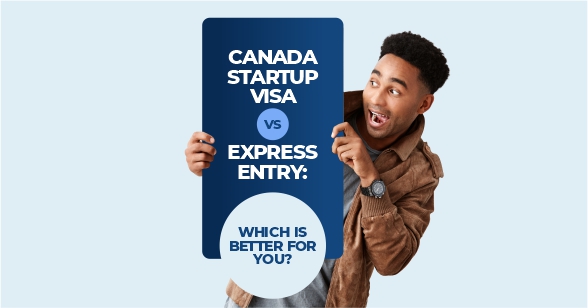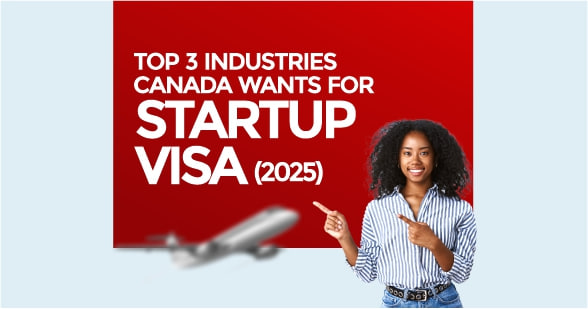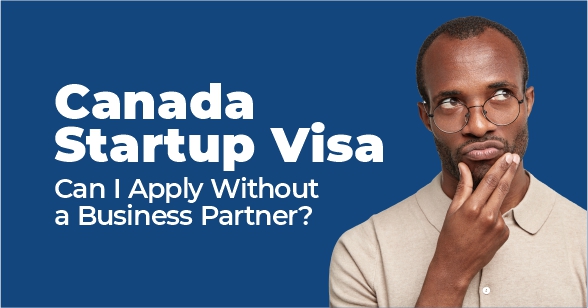If you’re planning to immigrate to Canada, you’ve probably come across two popular options: the Canada Startup Visa Program and the Express Entry Program. While both can lead to permanent residency, they are designed for different types of applicants and come with unique requirements.
In this post, we’ll break down the differences, advantages, and challenges of each pathway so you can make an informed decision.
What is the Canada Startup Visa?
The Canada Startup Visa Program (SUV) is designed for entrepreneurs who want to build businesses in Canada. To qualify, you must have a viable business idea and secure a Letter of Support from a designated organization (such as a venture capital fund, angel investor, or business incubator).
Getting that Letter of Support is often the most challenging step. In fact, many applicants fail because they don’t prepare their application properly. We’ve shared some of the biggest mistakes Nigerians make with the Canada Startup Visa, and avoiding them can make all the difference.
Who Should Apply for the Startup Visa
The SUV is best for:
-
Entrepreneurs with innovative ideas
-
Founders who can create jobs for Canadians
-
Business owners who want to scale globally
A strong business plan is critical here. Your business idea doesn’t just need to be “good”—it must convince Canadian authorities that it has potential for growth. If you’re at this stage, check out our guide on how to write a business plan that can help you get Canada’s Startup Visa.
What is Express Entry?
The Express Entry Program is Canada’s flagship immigration system for skilled workers. Unlike the SUV, this pathway doesn’t require you to start a business. Instead, it’s points-based and evaluates you on factors such as:
-
Age
-
Education
-
Work experience
-
Language proficiency
If you meet the cutoff score in the Comprehensive Ranking System (CRS), you may receive an Invitation to Apply (ITA) for permanent residency.
Key Differences Between Startup Visa and Express Entry
| Feature | Startup Visa | Express Entry |
|---|---|---|
| Purpose | For entrepreneurs starting a business | For skilled workers |
| Main Requirement | Letter of Support + innovative business idea | CRS points (age, education, work, language) |
| Processing Time | 12–16 months | 6–12 months |
| PR Eligibility | Direct PR if business succeeds | Direct PR after meeting CRS cutoff |
| Investment Required | Yes (to run your business) | No investment required |
Which Program is Easier to Qualify For
It depends on your profile. Skilled professionals with high education and language scores may find Express Entry faster. However, if you’re a founder with a scalable business idea, the Startup Visa may be a better fit.
Many Nigerian entrepreneurs ask us if business immigration is still worth it. The truth is, it is—especially since Canada is actively welcoming entrepreneurs. You can see why in our post on the top reasons Canada is welcoming Nigerian entrepreneurs through business immigration.
Which Pathway Leads to Better Long-Term Opportunities?
Both programs offer permanent residency, but they differ in lifestyle and business opportunities:
-
With Express Entry, you enter Canada as a skilled worker and typically get employed first before venturing into entrepreneurship later.
-
With the Startup Visa, you immediately enter as an entrepreneur and can build your business from day one.
In fact, many of our clients see the Startup Visa as a direct path to Canadian residency through business, since it allows them to merge both immigration and entrepreneurship goals. You can learn more in our article on how business immigration can turn your ideas into permanent residency.
Both the Canada Startup Visa and Express Entry are excellent pathways, but the right one depends on your personal goals.
-
If you’re a skilled worker with strong CRS points → Express Entry might be your fastest route.
-
If you’re an entrepreneur with a solid business idea → Startup Visa could open doors for both PR and long-term business growth.
Whichever path you choose, ensure your application is error-free. The smallest mistakes can lead to delays or even rejection. That’s why having expert guidance can make all the difference.
Frequently Asked Questions (FAQs)
1. What is the difference between Canada’s Startup Visa and Express Entry?
The Canada Startup Visa is designed for entrepreneurs with innovative business ideas and a Letter of Support from a designated organization, while Express Entry is a points-based system for skilled workers. Both pathways lead to permanent residency but target different applicant profiles.
2. Who is eligible for the Canada Startup Visa?
You are eligible if you have an innovative business idea, a Letter of Support, and the ability to create jobs for Canadians. To increase your chances, ensure you avoid the common mistakes Nigerians make with Startup Visa applications.
3. What is the processing time for Canada Startup Visa vs Express Entry?
Processing times can vary. On average:
-
Express Entry takes 6–12 months.
-
Startup Visa takes 12–16 months.
While Express Entry is generally faster, the Startup Visa can offer long-term business and residency benefits.
4. Do I need to invest money to apply for the Startup Visa?
Yes. While there is no fixed government-set amount, you need enough funds to establish and operate your business in Canada. For guidance, you should also prepare a strong business plan. Learn more from our article on writing a business plan that helps secure Canada’s Startup Visa.
5. Can Express Entry applicants start a business in Canada later?
Yes. Once you gain permanent residency through Express Entry, you can start a business in Canada. However, the Startup Visa is a faster route if your main goal is to immigrate as an entrepreneur.
6. Why is Canada welcoming entrepreneurs through business immigration?
Canada values entrepreneurship because it drives innovation, creates jobs, and contributes to the economy. This is why the government has made business immigration programs more attractive. You can read more in our post on the top reasons Canada is welcoming Nigerian entrepreneurs.
7. Which pathway gives me a better chance of getting PR?
It depends on your profile:
-
Skilled workers with strong CRS points → Express Entry is usually better.
-
Entrepreneurs with a viable business idea → Startup Visa is a more strategic choice.
Some of our clients have used the business immigration route to turn their ideas into permanent residency.
8. What mistakes should I avoid in a Startup Visa application?
Applicants often fail due to poor preparation, weak business plans, or not understanding the role of the Letter of Support. Make sure you review the red flags and mistakes to avoid when applying for Canada’s Startup Visa to increase your chances of succe







